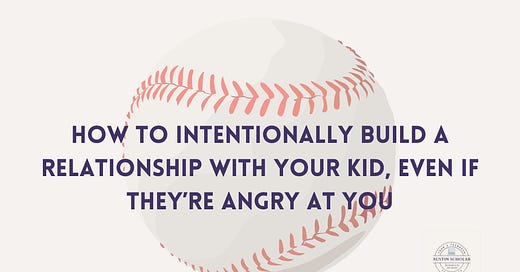Austin Scholar #70: How to intentionally build a relationship with your kid, even if they’re angry at you
& the yearly baseball tradition
Hey, y'all!
This week from Austin Scholar...
Austin’s Anecdote: The yearly baseball tradition
How to intentionally build a relationship with your kid, even if they’re angry at you
Scholar’s Sources: Ideas for traditions you can start with your teen
I'm traveling this week as part of a pretty cool project. I'm keeping it under wraps until it's finished, but keep your eyes peeled in a couple weeks for more information :)
Sadly, my parents didn’t come with me on the trip. And I’m going to be honest, I’m missing them. So, while I’m about to spend this entire newsletter talking about my relationship with my dad, I want to start by shouting out my mom.
You see, whenever I miss her, I listen to her band’s music on Spotify. All of her songs just give me a warm, soothing feeling. And I might be biased, but I also think they’re really good. Y’all should all go check them out.
Austin’s Anecdote: The yearly baseball tradition
I wasn’t always at the point where I could shout out my dad for being “the most supportive dad in the world” on Father’s Day. For years I was a typical teenager, angst-ing and being angry at my dad. We’d argue about school and privileges and more school.
But no matter how frustrated I got, one thing never changed: I wanted to be just like him.
My dad loves baseball, so I, of course, love baseball. Going to games was a super common birthday gift for him. So, when a new Rangers stadium opened in Dallas, my dad and I knew we had to go. Just our luck, too, the Rangers had a week of home games right after school ended.
It was decided.
And since we were staying for a week, we had a silent agreement that we couldn’t be fighting the entire time if we wanted to have fun.
The first test came when we got to the hotel and we realized I had messed up the room bookings. Instead of giving me The Disappointed Face, my dad just talked to the concierge and showed me how to fix it.
And when he told me that the barbeque line was going to get really long if we waited, but I just needed to finish my episode of Selling Sunset before we left, and because of that we had to wait an hour in line to get our pork chops…he just kept telling me about his “work drama.” Normally he would’ve told me that he wasn’t going to wait in this long line and walked away all huffy and dramatic. I was confused.
But when the first game started, it all started to make sense. All my dad wanted to do on this trip was connect with me. I started playing a game with myself to predict if the pitch was a ball or strike before the umpire, and my dad taught me about all of the different types of pitches. We had the MLB app pulled up on both of our phones and debated whether players were safe or not.
And I, of course, was on a mission to find the best, biggest scoop of ice cream in the stadium. I think I ranted to my dad for ten straight minutes about how little ice cream was in my scoop on the first day.
We didn’t talk (read: argue) about school once.
Every game was like that.
I came back from that trip smiling like I hadn’t in a while.
And every year since, we’ve made sure to prioritize going to Dallas for a week. Every year we have some sort of room debacle and wait hours for pork chops. We make fun of the umpires’ calls, try to guess the batters’ height, and search the entire stadium for the best ice cream stands.
The Rangers Stadium isn’t a place for disagreements or anger or frustration. It’s a place for connection.
Any petty argument about school just seems so insignificant when we’re singing Take Me Out to the Ball Game and betting on the Dot Race.
Now no matter how mad I get at my dad throughout the year, our Ranger’s Week is always something I look forward to.
How to intentionally build a relationship with your kid, even if they’re angry at you
It’s basically a rule of life: teenagers get mad at their parents.
Teens will get angry at their parents for many reasons: “overbearing rules,” “unfair restrictions,” and “too-harsh punishments” to name a few.
But in their hormone-driven world that lacks the nuance won by experience, they let their anger consume the relationship. A connection can’t exist while they’re angry.
So, they let their emotions rule, slamming doors and giving the silent treatment.
But parents, you have to realize: kids can be angry with you, but deep down, they desire your approval and connection. They crave connection. Your job? Show them it’s possible, even during disagreements.



